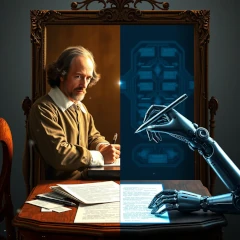The Poetry of Machines: AI Surpasses Human Recognition in Literary Creation

A new study reveals that AI-generated poetry is indistinguishable from human-written verse and often preferred by readers. The research, conducted at the University of Pittsburgh, involved over 2,300 participants across two experiments. Key findings include readers’ inability to identify AI-authored poems (46.6% accuracy) and a preference for AI-generated works when authorship was undisclosed. AI poems were rated higher for accessibility and clarity, while complex human-authored pieces were sometimes misidentified as AI-generated. The study highlights AI’s growing creative capabilities and raises questions about the future of literary creation. Researchers emphasize the need for transparency in AI-generated content and acknowledge the ongoing importance of human creativity in poetry.
Introduction
A groundbreaking study published in Scientific Reports ¹ reveals that artificial intelligence has achieved a significant milestone in creative writing. Research led by Brian Porter and Edouard Machery at the University of Pittsburgh demonstrates that readers not only cannot reliably distinguish between AI-generated and human-written poetry but often prefer AI-created verses. The study, involving over 2,300 participants across two experiments, found that AI-generated poetry was rated more favorably for accessibility and clarity, while complex human-authored poems were sometimes misinterpreted as AI-generated. These findings challenge traditional assumptions about AI creativity and raise important questions about the future of literary creation.
Research Methodology
The study employed a two-phase experimental approach. The first experiment engaged 1,634 participants in evaluating ten poems each: five written by renowned poets and five generated by ChatGPT 3.5 in matching styles. The selected human authors included literary giants such as William Shakespeare, Geoffrey Chaucer, and Emily Dickinson.
The second phase involved 696 participants assessing poems across 14 qualitative dimensions, including rhythm, beauty, and originality. Participants were divided into three groups: those told they were reading human-written poems, those told they were reading AI-generated poems, and those given no authorship information.
Key Findings
The research revealed several surprising outcomes. Participants performed below chance levels (46.6% accuracy) in identifying AI-generated poems, demonstrating the sophisticated capability of current AI systems. More notably, AI-generated poems received higher ratings across multiple quality metrics when authorship was unknown.
As Porter explains, “The most surprising result is how little formal and structural features of the poems seem to matter. Our participants looked almost entirely at the content of the poem when deciding whether or not the poem was AI-generated.” ²
Reader Preferences and Bias
A significant finding was the clear bias against known AI authorship. When participants were informed that poems were AI-generated, ratings decreased across all quality metrics, regardless of actual authorship. However, when authorship was undisclosed, readers consistently preferred AI-generated poems for their accessibility and straightforward communication of themes and emotions.
Technical Analysis
The study found that structural elements were less influential than content in participants’ evaluations. AI-generated poems maintained consistent patterns and demonstrated superior performance in conveying clear themes and emotions. This accessibility appeared to be a key factor in reader preference, as complex human-authored works were sometimes misinterpreted as AI-generated due to their sophisticated structure and meaning.
Implications for Creative Industries
The research represents a significant milestone in AI’s creative capabilities, particularly in a domain previously considered resistant to automation. However, as Porter notes, “AI doesn’t have experiences of its own, and it’s not trying to communicate ideas or information to you. AI is trying to mimic the patterns of human language production… AI does not know love or grief, but it does a great impression of someone who does.” ²
Future Considerations
The findings suggest a need for transparency regulations in AI-generated content, particularly given readers’ inability to distinguish sources. As the researchers note about their findings, “When readers say they prefer AI poetry, then, they would seem to be registering their frustration when faced with writing that does not yield to their attention.” ³
While this study utilized ChatGPT 3.5, it’s worth noting that since the research was conducted, numerous more advanced language models such as GPT-4o, Claude 3.5 Sonnet, or even Llama 3.2 have emerged that likely possess even greater poetic capabilities. This suggests that the already impressive results might be even more pronounced with current state-of-the-art LLMs.
Expert Perspectives
The academic community has offered varied responses to these findings. Keith Holyoak, a cognitive psychologist at UCLA, describes ChatGPT as a “quasi-plagiarist,” ³ while others see potential for coexistence between human and AI creativity. As Dorothea Lasky, one of the studied poets, states, “Poetry will always be necessary… There is room for all poets — even robot poets.” ³
Conclusion
This research demonstrates a significant shift in the landscape of creative writing and artificial intelligence. While AI-generated poetry has achieved remarkable success in reader appreciation and technical execution, questions remain about the nature of creativity and authentic human experience in literary expression. The findings suggest a complex future where artificial and human creativity may need to coexist, while maintaining clear distinctions in origin and intent.
- https://www.nature.com/articles/s41598-024-76900-1
- https://www.forbes.com/sites/torconstantino/2024/11/15/people-cant-tell-ai-from-shakespeare—they-prefer-ais-verse-study/
- https://www.smithsonianmag.com/smart-news/chatgpt-or-shakespeare-readers-couldnt-tell-the-difference-and-even-preferred-ai-generated-verse-180985480/